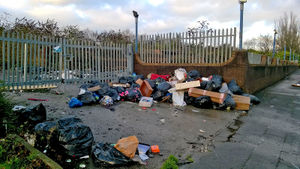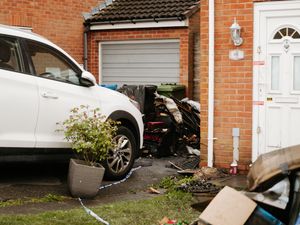Fly-tipping costs £2m a year
The full extent of the West Midlands fly-tipping epidemic is today revealed with an average of 90 incidents every day costing taxpayers over £2 million a year.

An Express & Star investigation has found 32,569 reports of waste being dumped illegally to councils across the Black Country, Staffordshire, Shropshire and Birmingham last year – a 16 per cent increase from 2012/13.
Organised criminal gangs who offer to dispose of rubbish at a knockdown price are believed to be behind ‘industrial scale’ dumping seen in recent months.
It cost the region’s councils £1.8m to remove dumped waste last year and a further £580,000 to investigate offences.
But only £54,706 was recouped through fines at court with authorities only bringing 58 prosecutions.
And only 456 fixed penalty notices were issued last year in the Midlands which would have returned between £54,000 and £182,000. It means taxpayers and landowners are left to meet the remaining cost of the colossal bill.
In May 2016, councils were given the power to impose £400 fixed-penalty notices for fly-tipping. But critics say that for criminal gangs – or even ordinary householders – it is worth taking the risk because the fine can be cheaper than hiring a skip for a fortnight.
Rising waste charges and moves to fortnightly bin collections have also been blamed.
The Environment Agency said it is investigating ‘a number of’ large waste sites in the West Midlands.
South Staffordshire MP Gavin Williamson said tougher sanctions were needed.
He said: “It is absolutely disgusting that environmental vandals on a commercial basis are dumping waste and rubbish across our countryside.
“We need to see judges issue punitive fines of £30,000, £40,000 or £50,000 rather than these ridiculous sums of £400. At the moment the risk is worth taking and it is not a deterrent.
“Judges need to develop a backbone and hit these criminals hard in the pocket and send them to jail.
“Only then will we see local authorities have confidence in taking prosecutions against these people. Offenders may think fly-tipping is a victimless crime but we all pay the price for it.” Figures from the Department for Environment, Food & Rural Affairs show that there were 4,599 fly-tipping incidents in Walsall last year, 4,140 in Sandwell, 3,456 in Wolverhampton, and 824 in Dudley.
There were also 471 cases in Cannock Chase, 417 in South Staffordshire, 538 in Stafford, 409 in Lichfield, and 648 in Wyre Forest.
In Birmingham there were 12,348 incidents.
Clearing up the waste cost Walsall Council more than £350,000 last year and Sandwell Council £250,000. Wolverhampton spent £142,000 and Dudley spent £49,000.
Cannock Chase Council paid out £29,000 while South Staffordshire Council spent £49,000, Stafford £20,000, Lichfield £31,000, and Wyre Forest just shy of £38,000.
Keep Britain Tidy said gangs of ‘unregistered waste carriers’, often advertising their services online, were exploiting the situation by offering to pick up rubbish ‘on the cheap’. It described the phenomenon as the rise of the ‘Facebook fly-tipper’.
In recent weeks a lorry full of waste was dumped in a country road in Yoxall, Staffordshire, closing the lane to traffic. And just last month 21 fridge freezers were left in Barr Lakes Lane, between Aldridge and Great Barr. In Wolverhampton piles of rubbish were fly-tipped outside the Shaw Road tip when it was closed.
Of all the incidents in the Midlands, there were nearly 6,000 that needed a transit van to remove the waste, and 808 occasions that needed a tipper lorry. In 147 cases it was even too big for a single tipper lorry to remove and required multiple trips.
In Staffordshire a specialist taskforce has been set up with councils, Staffordshire Fire and Rescue Service, Staffordshire Police, the Environment Agency, the Driver and Vehicle Standards Agency and Highways England, because illegal waste sites pose a high risk of fire.
Director of Response for Staffordshire Fire and Rescue Service Tim Hyde, who is chairing the multi-agency group, said: “This is a serious issue that we collectively need to address as soon as possible and we need the support of local residents and businesses.”
West Midlands Police and Crime Commissioner David Jamieson said travellers, who he likened to ‘roving vagabonds’ were behind some of the large scale dumping.
He said: “It is clear that some of these costly offences are the work of travellers who are dumping waste on an industrial scale. A small minority are akin organised criminals. I will raise this issue with the Chief Constable.”
Local authorities are responsible for fly-tipping but in cases when the rubbish is left on private land the property owner must pay the cost.





